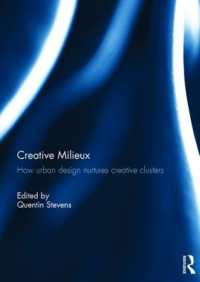- ホーム
- > 洋書
- > 英文書
- > Philosophy
Full Description
This volume sheds light on underexplored aspects of voluntarism that were extensively debated in thirteenth- and fourteenth-century philosophy and theology. By charting a map of complex and multifaceted debates on the will, it provides insight into approaches to ethics and moral psychology that sprouted in the later Middle Ages and sparked various arguments and methods for defending the freedom of the will.
Although interest in medieval ethics has increased in recent years, these studies mainly examine the concept of virtues, happiness, the freedom of the will, and the will-intellect interplay. These studies pay little attention to fourteenth-century ethics and largely neglect theories of action, the conditionality of the will, and the will-time issues. The chapters in this volume illuminate new approaches and reveal the multiple facets of the will-debate that emerged in the late medieval period. They address a wide range of topics such as second-order volitions, non-velle and nolle acts of the will, conditionality of the will, increase and decrease in the intensity of willing, the ethics/metaphysics and ethics/physics intersections, and the role the will played in explaining social and political phenomena.
The Will Discourse in Late Medieval Philosophy and Theology will be of interest to scholars and advanced students working on medieval philosophy and theology, moral philosophy, philosophy of mind, and action theory.
Contents
Introduction Michael W. Dunne and Monika Michałowska 1. Individual and Common Intentions: The Role of the Will in the Institution of Human Language and Sacramental Signs in the Late Middle Ages Claudia Appolloni 2. Marguerite Porete on the Will Pascale Bermon 3. The Effort of the Will in Richard Middleton's Sentences Commentary Michael Szlachta 4. Instants of Nature and Formalities: The Structure of the Will according to Francis Meyronnes Sylvain Roudaut 5. The Power to Do Otherwise in Fourteenth-Century Philosophy: A First Approximation Martin Pickavé 6. Do I Really Want It? Walter Burley on Choosing Virtue and Vice in his Commentary on the Nicomachean Ethics Marek Gensler 7. Richard FitzRalph on Whether Cognition Necessitates Volition: Finding a Middle Way Michael W. Dunne 8. Adam Wodeham on the Joy of Knowledge and of Being in Different Mental States Lydia Deni Gamboa 9. Richard Kilvington on Ethical and Theological Objects and Changes: When Ethics Meets Physics and Geometry Monika Michałowska 10. The Physical Modelling of the Will in Robert Halifaxʼs Questions on the Sentences, Question 6 Edit Anna Lukács 11. To Will or Not to Will, Is That the Question? John Buridan's Theory of the Will, Its Being, and Its Acts Valeria Buffon 12. Power, Transcendence, and the Trinity: The Formal Distinction between the Will and the Intellect in John Ripa Andrea Nannini 13. In Perfect Conformity to God's Will Lies Our Freedom: Teresa of Ávila Kateřina Kutarňová







